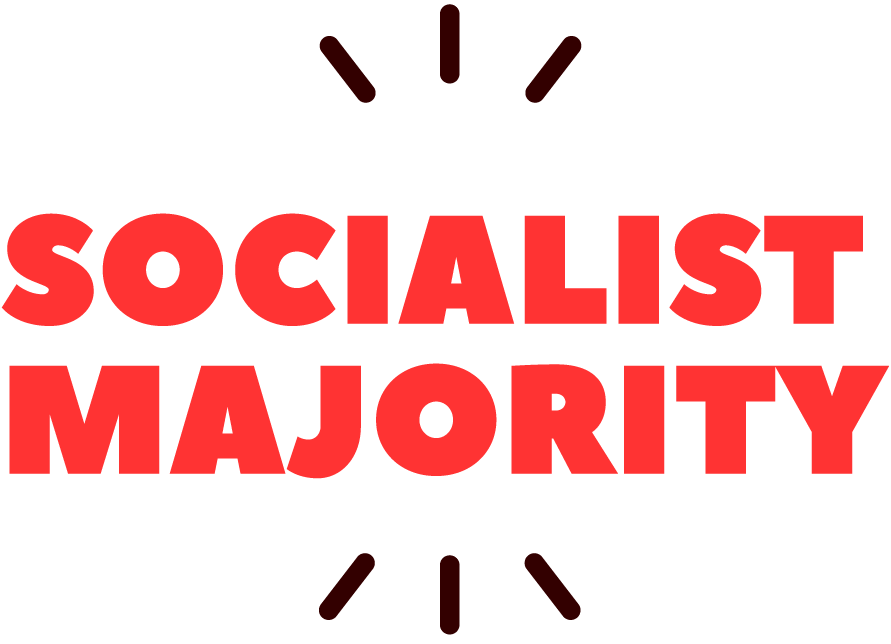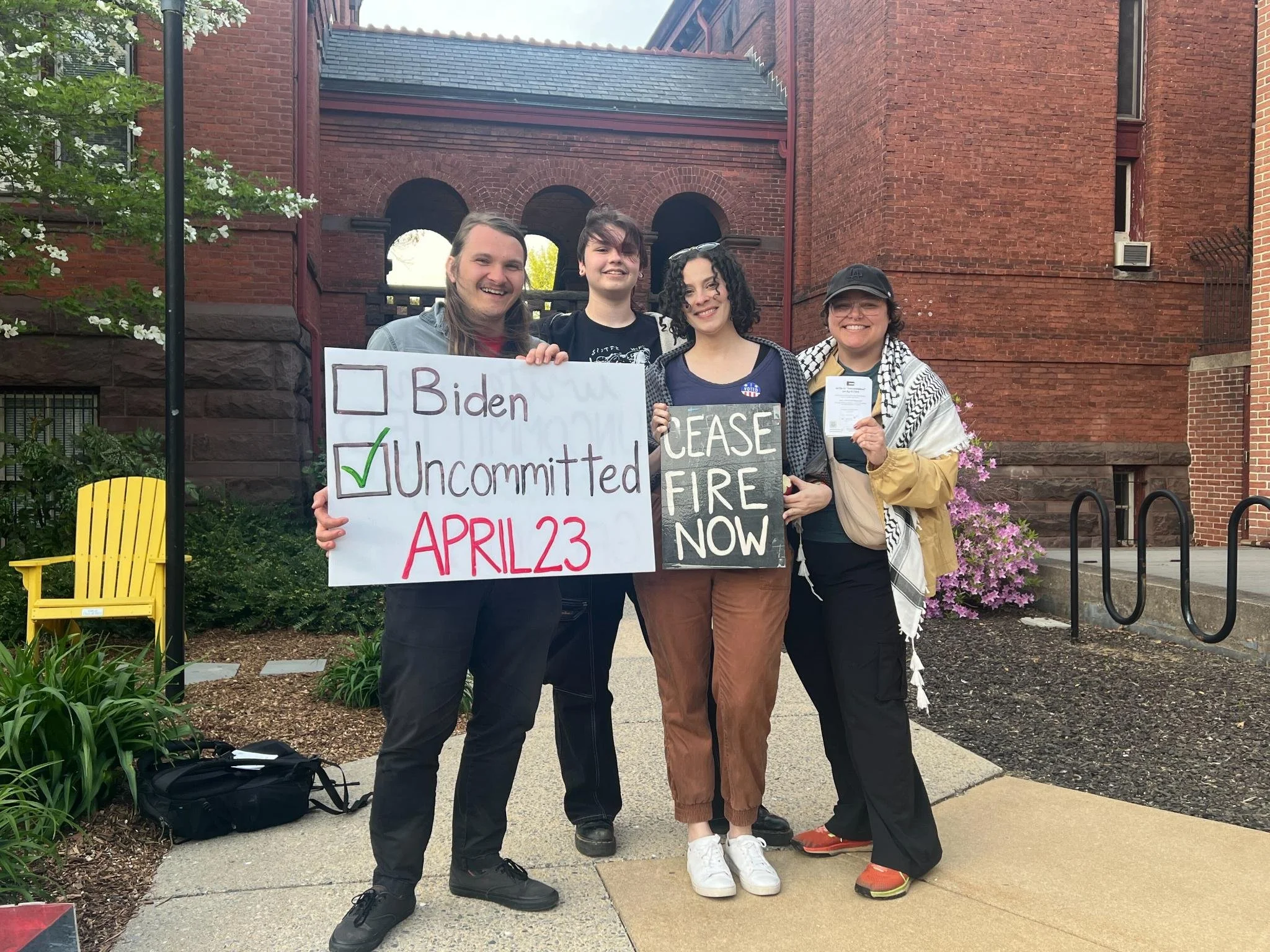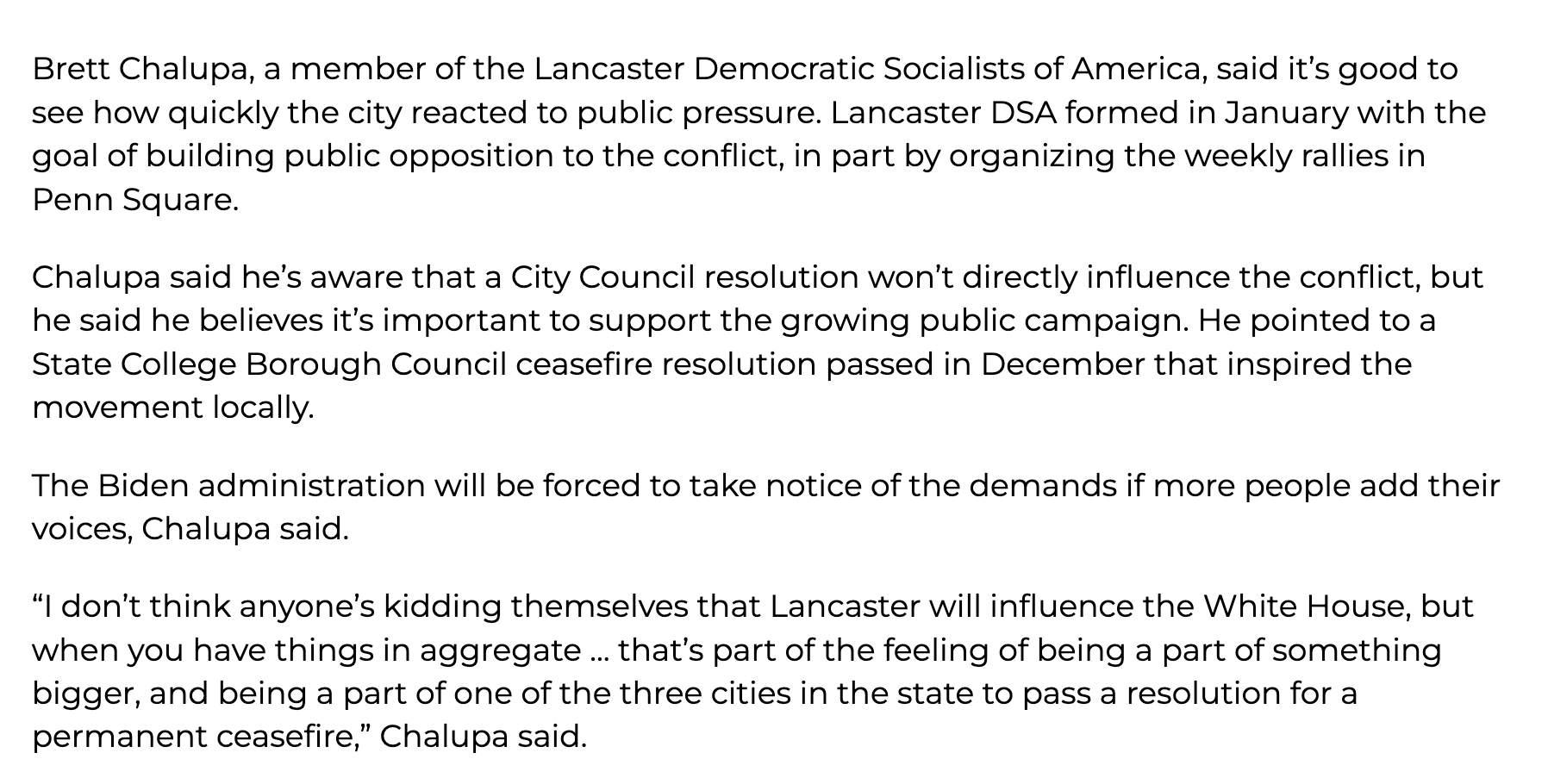Brett C. and Uncommitted: How SMC Members Contributed to the Historic Protest Vote Against Genocide in Gaza
SMC members have been among the DSA members who threw themselves into building “Uncommitted” campaigns across the country. As part of a limited series, we’re interviewing three of our SMC comrades about the roles they played in DSA’s efforts to build a national movement to stop U.S. funding of Israel’s genocide in Gaza.
These interviews were conducted over the phone between April and June 2024, and have been edited for clarity. This is the third interview of three in this series.
Brett C. (left) and other Uncommitted supporters.
Brett C.
Brett joined DSA (and Socialist Majority) this past year, after being politicized by the ongoing genocide. He currently leads the brand-new Lancaster DSA and recently chaired Pennsylvania’s Uncommitted campaign.
You joined DSA as a part of your work on Palestine. Can you talk about that?
In the couple of days after October 7th, it was very clear what was happening. It was very clear that there was a genocide happening. I have a baby, and it was a Saturday, and I made a sign protesting the genocide that said something like “Stop bombing and killing innocent civilians.” And I went with my year-old baby and stood solo in the town square for an hour and a half, just holding up the sign. That was the first activism I've ever done. I was very moved and continue to be seven months later, and I am very frustrated and upset by what's happening in Gaza. Being a new parent and thinking about all these kids being killed with our tax dollars, it's horrendous.
After my baby went to bed, I would watch hours of Noam Chomsky speaking about what Israel has been doing to Palestine for decades. Chomsky also speaks a lot about socialism, which was my first serious introduction to it. There are a lot of theoretical and philosophical texts out there, but I'm very action-oriented. I want to start projects that matter and finish them. So I knew I needed to find an organization.
“Being a new parent and thinking about all these kids being killed with our tax dollars, it’s horrendous. ”
I surveyed the left in Lancaster County, PA, which is a deeply conservative, Christian nationalist county. In the City of Lancaster, there is a local leftist organization that does a lot of good electoral work, but their plans for Palestine work didn’t extend much beyond a vigil. I decided not to join that organization to organize for a free Palestine or a ceasefire, because that's not their position and they aren’t democratic enough for me to change that, even though they are not too different from DSA in other ways.
Excerpt from Democratic Left, “A Journey to Chapterhood in Lancaster, Pa.,” published March 21, 2024.
At this point, I already had a pretty clear image of the organization I thought we needed to fight for Palestine, and that could also have a big impact beyond Palestine. I wanted to join an organization that was already doing that or start my own.
There is a PSL chapter here, so I met with them, too. When I asked about what the branch had accomplished in ten years, the answer was not much. They are great at rapid response—getting posters printed, being at a protest within hours of something happening—but I didn’t see them actually organizing the working class. They’re more focused on organizing and appealing to activists. PSL also has a lengthy, convoluted process for becoming a member, and I had heard negative things about the internal culture, so I didn’t think that was the organization for me.
All that was left was the local Green Party, which isn’t very active and didn’t respond to my emails. I was drawn to DSA, even as an at-large member, because of how easy the organization is to join, how transparent the processes are, and the organizing DSA was doing for Palestine. So I joined DSA in late October and started working on getting a chapter started in Lancaster at the beginning of 2024.
How did the Uncommitted campaign start in Pennsylvania?
Excerpt from LNP | LancasterOnline, “Lancaster city ceasefire resolution could build public trust, add to growing movement across nation,” published June 20, 2024.
There were a few things I really wanted to accomplish to contribute to the struggle for Palestine. I wanted a ceasefire resolution in our city, and I wanted to do weekly actions so that people wouldn’t forget that there are people with a moral compass in Lancaster who are against what's happening. No one was organizing in that way.
Starting a DSA chapter was a great way to move forward because it drew out people who were pro-Palestine, since that was the primary thing we're organizing for. We started the chapter in January, and we have had six months of consecutive weekly rallies. At the time, we were also organizing for a City Council ceasefire resolution, which ended up passing on June 25th. It took a lot of work, but we have been able to build up a chapter around it. Palestine and transgender rights have been the two issues that have been our primary focus, and we've been able to have an impact and build momentum around them.
“It was a moment where I realized this is why I’m part of DSA, and this is DSA at its best.”
As soon as Rashida Tlaib started publicly talking about Listen to Michigan, one of our members said we should do something like that in Pennsylvania. We researched it, and Pennsylvania doesn't have an Uncommitted bubble on the ballot the way Michigan does. This meant that we’d have to do something different—a write-in campaign. I went to the DSA Discussion Board and asked about it, and people said that DSA was involved in the Michigan effort. It turned out that people like NPC member Renée Paradis and other Socialist Majority members were working on that effort. It was a moment where I realized this is why I’m part of DSA, and this is DSA at its best. We're part of a broad coalition of people to have a big impact through a campaign that is well-run and well-organized.
Our chapter didn’t know if the other Pennsylvania DSA chapters would get on board, but we took a vote and voted unanimously to do an Uncommitted campaign in Pennsylvania. Because we have got to stop the genocide. At the time, none of us knew how much work it would be and how hard it would be.
How did you approach coalition work outside of DSA? How was a broader coalition helpful?
At first, it was just DSA members in Pennsylvania in a group chat. There apparently hadn’t been much of a network of Pennsylvania DSA chapters, so we were just figuring out basic questions, like what to write in on the ballot.
At the same time, these other groups, including Palestine coalitions, other leftist groups, and Muslim American groups, were starting to have these same conversations. Those conversations would eventually come together to form our coalition. One of the primary partners was Emgage Action, which is a Muslim voter advocacy group—they were the first people to call us. And then, that same night in early March, their board met, voted, and said, “Let's do it!” And they just instantly committed to this campaign.
One distinction I want to make is that there can be organizations in the coalition, but that doesn’t necessarily mean they are leading the campaign. There’s a difference between who is driving the organizing and the broader coalition. The dynamic that played out was we had more than fifty organizations endorse our campaign who were sharing it with their networks, but Emgage Action really stepped up and committed financial resources. We developed a steering committee, or “core” of the groups that had the skills, capacity, and time to drive the campaign forward.
“We grew from ten organizations to twenty to ultimately over fifty organizations.”
I think a lot about things from the perspective of, “How do we make it easy for organizations to do the things we want them to do?” In this case, we wanted to make it easy for them to get the message out. So what we did throughout the campaign and throughout other projects I've been working on in Lancaster is to make toolkits. These were simple Google Docs that have graphics that can be downloaded and email templates that can be copy-and-pasted and sent to their bases. They have messaging guides. They have design style guides. They have colorways that organizations could use and language guides on how to talk about the campaign. We built all these toolkits and then sent to organizations in the coalition.
By focusing on creating resources that make it really easy for organizations to join and participate, it made it possible for us to scale up the campaign. We grew from ten organizations to twenty to ultimately over fifty organizations. We wanted the organizations we were working with to do their thing and connect with their bases, because we know that Emgage, PA Stands Up, and the Philly Palestine Coalition are all going to have different bases and messaging than DSA. We wanted to empower all these organizations to function pretty autonomously, and I think that's organizing at its best. I don’t think any one person was the bottleneck, and I think that was the right way to do it because we didn’t have any full-time staff on the campaign.
What was the role of Socialist Majority? How did being a member of SMC help you do the work you did?
There were a few things that led to me joining SMC. I'm involved with DSA’s Trans Rights and Bodily Autonomy campaign, and SMC member Genevieve R. is leading that. I have immense respect for her and really think that Genevieve is an incredible organizer.
“SMC’s position on the budget crisis combined with Genevieve’s leadership on the Trans Rights and Bodily Autonomy campaign were the most important reasons that, as a new leader, I decided to apply to join SMC.”
Meanwhile, DSA’s budget crisis was happening. I was worried I had just joined an organization that was imploding. I was struggling with it because I'm in Lancaster asking people to join this organization while wondering if it will even exist in a few months. I was really frustrated about it, because I couldn’t understand how past NPCs and the current NPC got DSA into the financial position it’s in. On the DSA Discussion Board, I was seeing what I thought were just clearly unfair anti-staff sentiments. I felt like a tiny minority on the Discussion Board, so I checked out Twitter, even though I haven’t used social media in a decade. That’s where I started to see SMC members who were using Twitter more as an organizing tool than an emotional crutch.
Joining a caucus felt like an important way to build power to help drive the direction of DSA in the long-term, and a way for me to further my political growth. SMC’s position on the budget crisis combined with Genevieve's leadership on the Trans Rights and Bodily Autonomy campaign were the most important reasons that, as a new leader, I decided to apply to join SMC.
How did SMC help Uncommitted PA?
Connecting with Renée and other SMC members to talk about the campaign was invaluable. Being new to organizing and having access to more experienced organizers meant so much to me and really helped the campaign.
“SMC believes we must build a broad, strong coalition and work in collaboration.”
Early on, there were some people who wanted our steering committee to only be DSA—that anyone who was driving the campaign had to be a DSA member. I had a vision from the beginning that there would be Palestinian, Arab, and Muslim American leaders that would take leadership, even if they weren’t in DSA, which we ultimately did accomplish somewhat. The idea of DSA alone driving this thing was pretty shocking to me, and it highlights the different organizing approaches of the caucuses. SMC believes we must build a broad, strong coalition and work in collaboration, whereas other caucuses seek full control in these situations.
Uncommitted PA was happening when I was first joining SMC, and talking to Renée really validated my intuition that having people from outside DSA in this coalition could be instrumental and important, and that ended up being true, especially with some of the volunteers who weren't in DSA but who really stepped up to make the campaign a success statewide.
I think Renee's leadership and guidance and saying the thing I needed to hear at exactly the right time gave me confidence in our approach.
How do you feel about the results? What’s next?
I'll give the happy answer first, and then I'll give the more complicated answer.
Our goal was 40,000 write-in votes for the Democratic presidential nominee, and we got over 60,000. I think to reach 150% of the goal is amazing.
Pittsburgh and Philly showed up in just immense numbers. In Philly, the write-in percentage was 9%, which is unheard of. Same with Allegheny County and Pittsburgh, where was about 7.5%. It was incredible turnout, and a huge testament to all our field work. We were really pleased with it.
The thing that I've been struggling with is after Election Day. On Election Day, we're poll greeting, meeting voters, talking to them, and hearing from them. That night, staying up late as the results were rolling in, I saw that the numbers were good. If you are a person who’s won an election campaign, there's something that comes next. The candidate goes into office and you celebrate. It's the beginning, and the election is just an early step in the process. There are human beings at the center of it that you elect.
“And all this was just one moment in an eighty-plus-year struggle for a free Palestine.”
After the Pennsylvania primary, it felt like postpartum depression, not too dissimilar to when my first child was born. The campaign got press coverage, but it didn't bring about a ceasefire. It didn't make Joe Biden instantly change his position. We didn’t think that it would, but you still want that to be what happens. The campaign makes demands and you want them to happen. I felt a little lost after the campaign ended. And we didn't really plan much about what this looks like after—we didn’t know what would happen on the day after the primary.
For the past week, I have been thinking about that. The campaign was successful, which is important. We contacted over 500,000 voters in Pennsylvania about making a protest vote for a ceasefire. That’s amazing, right? We’ve built this network across the state of the broad coalition, and we’ve also started to unite the Pennsylvania DSA chapters. All very good things.
And all this was just one moment in an eighty-plus-year struggle for a free Palestine. I am so proud to have been part of this one moment. Initially, I wasn’t thinking of this as just one moment in a long story, and that is very humbling. It was right around Election Day, just before, when the campus encampments started to launch. So that was all happening at the same time, and we were and had been on campuses flyering. Uncommitted PA had huge turnout with college students. And then, after Election Day, everyone shifted their focus to the encampments and the next part of the story and struggle.
So yeah, I have a lot of mixed emotions following the primary—proud and exhausted.



